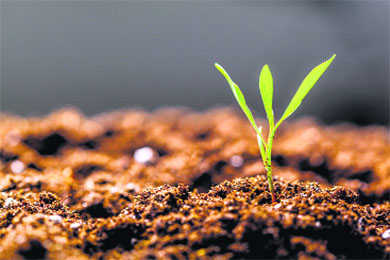
The soil health is the key to sustained crop productivity. Yet, it remains poorly emphasised in the ongoing debate on paddy straw management. The predominant rice-wheat cropping system in Punjab averages 12 tonnes of foodgrains per hectare, an internationally competitive level of productivity. Most of the produce moves out of the state. Hence, the soil needs constant replenishment with nutrients, mainly from inorganic fertilisers.
The manufacturing of fertilisers for three major nutrients — nitrogen, phosphorus and potassium — is energy intensive. Manufacturing of phosphorus and potassium requires mining of non-renewable natural deposits. As these deposits are finite and farmers will have to eventually pay huge price for them.
Crop residues such as paddy straw are primary source of organic carbon and nutrients. Paddy straw from one hectare, when used as mulch, will add about 33 kg nitrogen, 14 kg phosphorus, 150 kg potassium, 7 kg sulphur besides 2,400 kg of carbon besides 1-3 kg of micronutrients (zinc, manganese, iron and copper).Overall benefits are even more.
Farmers generally resort to burning of paddy straw to prepare fields for timely sowing of the succeeding crop. The release of large amounts of air pollutants, black soot, non-methyl hydrocarbons, volatile organic compounds and particulate matter become a serious matter owing to the scale and intensity of the event, as it happens in a short window of time.
Besides contributing to global warming, it affects human and animal health adversely. Burning of paddy straw results in loss of more than 90 per cent carbon, 80 per cent nitrogen and sulphur, 20-25 per cent phosphorus and potassium contained in it. In monetary terms, about Rs 2,000 worth of nutrients per hectare (Rs 650 crores for the state) are destroyed and it does not include the cost of precious carbon lost during the process of burning. In addition, paddy straw burning destroys the beneficial micro-flora and fauna of soil causing adverse impact on soil health.
Loose residues in rice fields, left after the combine harvesting, interfere with the existing tillage and sowing practices for the next crop. Options are now available for overcoming this problem. The PAU Straw Management System, an attachment for combine harvesters spreads the loose paddy straw evenly without adding an extra operation. This facilitates the use of Happy Seeder; a one step, no tillage operation, for sowing of wheat crop in the standing stubbles. The straw remains as protective mulch on soil surface.
Alternatively, mould board plough or rotatvator may be used for incorporating straw in the soil, followed by sowing of wheat with conventional seed drill. Similar options are also available for sowing of potato, pea and other vegetable crops after rice. Through extensive research trials and demonstrations, these interventions have proven to be extremely worthwhile, and experiences of large number of farmers have confirmed this. Apart from specialised machinery, the farmers are innovatively deploying the available machines to manage paddy straw in the field. Some extra effort, this might entail, would prove rewarding in the context of soil health. The real aim is not to treat paddy straw as a disposal problem but to consider it as a crucial input from the angle of sustainability and soil health.
Studies conducted in North-West India clearly show that in-situ paddy straw management in wheat fields is safe with respect to gas emissions. No emission of methane was detected because soil redox potential remained above the critical level needed for methane production. Water percolation in fields with residues is much higher due to better soil porosity, thereby minimising the production of nitrous oxide, another greenhouse gas.
Multiple options for retention and incorporation of paddy straw in the field are available. The benefits that accrue from the new practices are obvious in both short and long term. Punjab farmers would hopefully realise that soil health gain, by far outweighs the paddy straw management pain.
What 1 hectare gets from paddy straw
- 33 kg nitrogen
- 14 kg phosphorus
- 150 kg potassium
- 7 kg sulphur
- 2,400 kg carbon
- 1-3 kg of micronutrients (zinc, manganese, iron and copper)
Benefits of in situ paddy straw management
- Meets nutrient requirements
- Enhances soil organic carbon
- Improves water availability
- Improves soil health, soil porosity
- Increases soil bacteria and fungi
- Straw mulch reduces evaporation loss
- Moderates temperature extremes
- Suppresses weed growth in wheat
— The writer is Head, Department of Soil Science, Punjab Agricultural University, Ludhiana



























